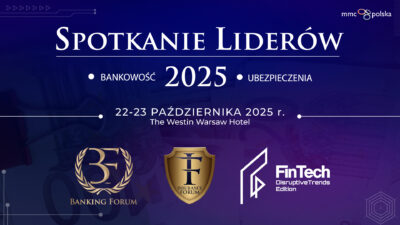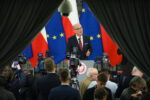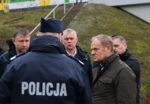Backstage gambits done by ex- KGB and Stasi agents and connections between politics and big business – according to investigative journalist Jens Høvsgaard, this is what circumstances around construction of Nord Stream looked like. His book „Spionerne der kom ind med varmen” that describes backstage of this controversial investment has only just made it to Danish bookstores. According to him, most important politicians in Sweden, Finland, Germany and Denmark were blackmailed and bribed. BiznesAlert.pl talked to Høvsgaard about what he was able to determine during his investigation.
BiznesAlert.pl: Your newest book dedicated to creation of gas pipeline Nord Stream behind the scenes has been released on the 1st of September in Denmark. What will the reader learn from it?
In the book I take the readers behind the scenes in the political game of Nord Stream when permission for the first part of the controversial gas pipeline at the bottom of the Baltic Sea needed to be secured in 2010. I document how the Kremlin and Gazprom, with Putin and a number of former Stasi and KGB agents at the forefront, bribed and blackmailed decision makers and politicians as high-up as the prime ministerial level in Sweden, Finland, Germany and Denmark. It’s a nasty story!
In free translation the title of your book goes: „The Spies Who Came in with the Heat”. Could you explain the meaning of the title?
The title „The Spies Who Came in with the Heat” is a wordplay and a tribute to the famous spy novel „The Spy Who Came in from the cold” by John le Caré. Matthias Warnig, the managing director of Nord Stream, is former Stasi-agent in GDR and undercover spy in then West Germany. Vladimir Putin who is in full control of Gazprom is former KGB agent. The two men are old friends and have a shared past as agents in Dresden during The Cold War. And when they needed to secure the permission for the Nord Stream pipeline back in 2009, they drew on former intelligence colleagues and used several tools available from the spy toolbox to put pressure on and blackmail politicians and civil servants in the affected countries. In general, former KGB intelligence officers, so called siloviki’s, have prominent positions in Putin’s Russia and Gazprom. Five out of six top executives in Gazprom are former KGB spies. Because of that, I find the title suitable for the book.
Currently preparation works for Nord Stream 2 are going on. Is it possible to compare the atmosphere of 8-9-year-old conversations, when Nord Stream was being built to those about Nord Stream 2?
The world is not the same as in 2009. But Putin,s siloviki system is the same. It has not changed a bit since then. Still, Nord Stream and Gazprom use threats towards governments and generous donations to stakeholders to obtain permission to construct the new branch, Nord Stream 2. In a western objective, Putin and Russia in 2009 was a partner to be. Even if countries like Poland, Ukraine, and the Baltic states over and over again warned the rest of Europe about Putin’s and Russia’s willingness to use gas as a political weapon only a few western leaders paid attention. In my book, I reveal leaked diplomatic cables and documents showing that the geopolitical consequences of allowing the Russian gas project was neglected i 2009. For countries like Denmark, danish companies access to the Russian market was of higher priority than stability in Ukraine. Today the politicians know better, but how to say no thank you to Putin and Nord Stream now when you welcomed them in 2010? That’s the dilemma.
Denmark considers publishing an environmental approval regarding the construction of Nord Stream 2 through its territorial waters. What is the attitude of the Danish government and the public opinion in Denmark in this case?
In 2009 there was no public debate about Nord Stream in Denmark. The government pulled curtains down to the public and did several times misinform the public and the opposition parties when asked about the project. The Government and its prime minister Lars Løkke Rasmussen did literally sell their soul to Putin and Nord Stream in exchange of high-level visits. Denmark and Russia had not exchanged state visits in 46 years. From 2009 – 2011 the Danish prime minister visited Russia three times and both prime minister Putin and president Medvedev was on official visits to Denmark, and finally, in 2011 the Danish queen and prince consort and the crown prince and crown princess paid a four-day long official visit to Russia. Actually, Denmark could have blocked the project. A part of the pipeline is crossing through Danish territorial, and not only in the so called exclusive zone. In the exclusive zone all countries are allowed to construct pipelines if they do not harm the environment. In territorial waters, it’s all up to the respective country to decide if permission should be granted or not. The first drawing of the line in Danish Waters was in Denmarks exclusive economic zone. But due to environmental issues, it had to be moved either further out or closer to land. All experts advised to move it further out in the waters between the Danish island Bornholm and Poland. But Russia and Nord Stream did not like that proposal. In several years Poland and Denmark has been in dispute over the rights of their maritime areas between Bornholm and Polish coast. In spite of the negotiations initiated in 1972 Poland and Denmark have not so far managed to effect a delimitation. It was Russia’s and Nord Streams fear that an agreement between the two countries would send the rights to Poland. Therefore a part of the pipe line was decided to cross into the Danish territorial waters. But the Danish government did not inform the public about the possibility to reject Nord Streams application. An agreement between Vladimir Putin and Danish prime minister Lars Løkke Rasmussen was made and kept secret.
In your book, you payed a lot of attention to ex Soviet and Eastern German secret services. What influence did they have on building Nord Stream? Are the same intelligence actors present in the game of Nord Stream 2?
Nord Stream and Gazprom are controlled by former intelligence officers from Stasi and KGB. In cooperation with the former German chancellor Gerhard Schröder who serves as chairman of the board of Nord Stream, they have a direct pipeline to decision makers in both Denmark, Sweden, and Finland. And they uses their connections. Former Swedish prime minister Göran Persson is now a well paid Nord Stream lobbyist, and the same is the former Finnish prime minister Pavoo Lipponen. As the first Nord Stream company, Nord Stream 2 is also registered in Zug in Schwitzerland and the management is also the same: Matthias Warnig is CEO and Gerhard Schröder chairman of the board.
Will your book be translated into English or Polish?
Hopefully the book will be translated very soon. My literary agent is promoting the book just now. If the rigths are sold to Poland it will not be my first polish publication. My two crime stories Siódmy Dzień and Martwe Księżniczki nie śpią are publised and sold by Czarna Owca.
Interview by Bartłomiej Sawicki







